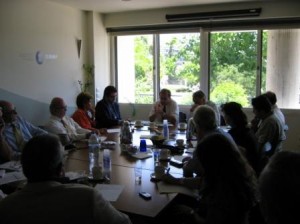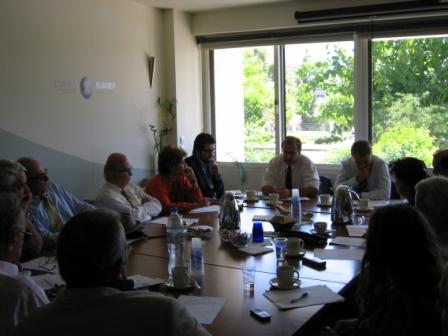 The Hellenic Foundation for European and Foreign Policy (ELIAMEP) organised a lecture delivered by the Secretary General for Public Order Ambassador Constantinos Bitsios. The lecture was held on Tuesday 22 September 2009 at ELIAMEP offices.
The Hellenic Foundation for European and Foreign Policy (ELIAMEP) organised a lecture delivered by the Secretary General for Public Order Ambassador Constantinos Bitsios. The lecture was held on Tuesday 22 September 2009 at ELIAMEP offices.
The question of irregural migration, has surfaced in recent months as a highly important political issue with strong economic and social implications for Greece. Ambassador Constantine Bitsios, Secretary General for Public Order in the Ministry of Interior, provided an overview of certain basic problems Greece faces in managing and controlling migration flows, focusing on the country’s eastern entry points.
To deal with the issue of irregular migration, Greek migration policy is concentrated mainly on two axes. On the national level there is a conscious effort to increase the percentages of voluntary returns by immigrants who have been illegally residing in the country. In parallel there are structured attempts to prevent more migrants from entering illegally in the country. To succeed in this second goal – that is preventing the illegal entry – good cooperation between Greece and Turkey is a prerequisite, an issue of frequent dispute between the two countries.
Strengthening the system of asylum-giving is yet another priority in the immigration policy as until today the number of positive asylum cases is disproportionate to the number of asylum applications, while the entire process appears to be significantly problematic. New asylum committees have been formed to deal with the above issue, with the processing of asylum seekers’ applications as their sole mandate. This new procedure is at least disputable, however, by a great part of the wider civil society that deals with the subject, seeing that resources in structure and personnel appear to be inadequate. More so, the suspension of the second-degree asylum application and the subsequent withdrawal of the High Commission from the first degree control processes put a question mark on whether the intention to improve the functioning of asylum application processes in the country is actually present in the new system.
According to Mr. Mpitsios, Greece’s geographical position renders it an entry-point for a significant number of migrants and asylum seekers, which puts an additional burden both on the budget as well as on human resources. The application of the Treaty of Dublin II in relation to the examination of asylum applications by the first safe country entered, appears to be very problematic pressuring disproportionately the Mediterranean countries (including) Greece. Moreover, it appears according to Mr. Bitsios, that Northern European Countries are indifferent to this matter as there are not directly affected.
On the whole, Greece wishes to render the question of irregular migration as a matter dealt with on the European level with common policies adopted by the member states. The need to approach comprehensively the issue of irregular migration on the national level in Greece is underlined, in parallel, including not only an improved management of migration flows (regular or irregular) but also the inclusion of migrant population already residing in the country.
Professor Loukas Tsoukalis, President of ELIAMEP, moderated the discussion.



